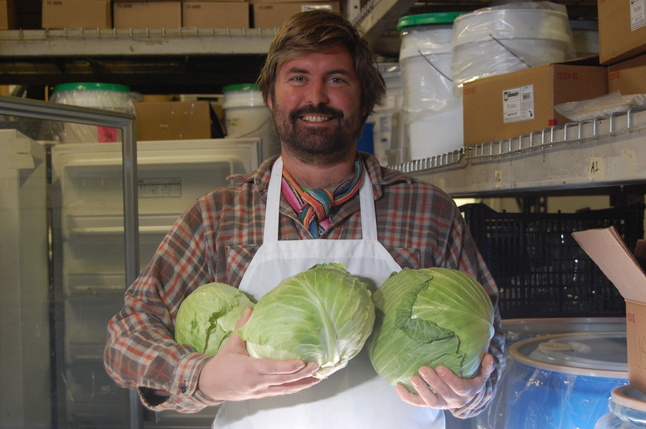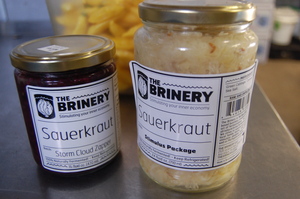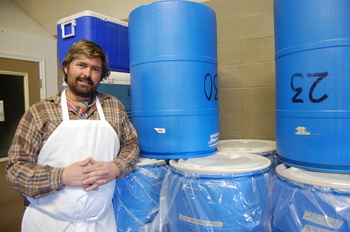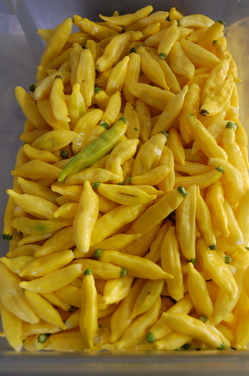The Brinery in Ann Arbor uses crowdfunding in its attempt to double sauerkraut production

David Klingenberger is trying to raise $12,000 so he can turn 12,000 pounds of locally grown cabbage into sauerkraut at his Ann Arbor business, The Brinery.
Janet Miller | AnnArbor.com
He has turned to the crowdfunding platform Kickstarter to raise $12,000 to buy 12,000 pounds of locally grown cabbage in an effort he’s calling “40 Barrels in 40 Nights,” which went up on Kickstarter Oct. 5.
“It’s akin to an NPR pledge drive,” Klingenberger said. “You donate money to things you believe in.” He’s hoping the effort will allow The Brinery to double production.
But it’s more than a way to raise money, he said “It creates a platform for our community to be part of our success,” Klingenberger said. “Kids who love our pickles can donate $1 while someone else could pledge $1,000.”

Janet Miller | AnnArbor.com
The Brinery’s largest pledge has been $500, with a total of $1,570 pledged one week after the project was posted.
While Kickstarter backers make pledges, they are not buying a piece of the company or future earnings. Instead, they receive rewards, which can range from a thank-you note to T-shirts. The Brinery backers will be given everything from stickers to having a custom-made batch of collector’s edition sauerkraut named after them, complete with a custom-designed label, Klingenberger said.
No money is collected unless the goal is met.
While Kickstarter targets creative projects such as indie films, video games and music, there is a category for food projects. But few have anything to do with fermentation, said Klingenberger, who calls himself the company’s CFO - chief fermentation officer. “Most of it is cupcakes, gluten-free or breweries,” he said.

David Klingenberger will need 40 more plastic barrels in order to double his sauerkraut production.
Janet Miller | AnnArbor.com
The Brinery was started in 2010 after Klingenberger was confronted with a bumper crop of cabbage. As farm manager of Tantre Farm, he needed to figure out what to do with more cabbage than they could sell. He made sauerkraut using a no-cook fermentation process, and began selling it at the Ann Arbor Farmers’ Market, the Eastern Market in Detroit and eventually to Zingerman’s Deli. It is also sold at 35 stores and restaurants around southeastern Michigan, with an eye on expanding distribution to northern Michigan and the Chicago area, Klingenberger said.

In addition to sauerkraut, The Brinery produces kimchi, spicy pickled carrots, pickled turnips, fermented hot sauces and more.
Janet Miller | AnnArbor.com
The Brinery, in addition to a revolving menu of sauerkrauts, produces smaller batches of other fermented vegetables such as kimchi, spicy pickled carrots, pickled turnips, fermented hot sauces and more.
Fermented vegetables are a healthy, probiotic-rich food good for the digestive tract. From start to finish, the process is raw; nothing is cooked, Klingenberger said. The Brinery’s production facility is located in a subleased space behind Hello Faz Pizza on West Liberty Street, near West Stadium Boulevard.
While The Brinery had raised 13 percent of its goal after one week, Klingenberger was optimistic that he’d meet the Nov. 4 deadline. “I’ve been told in the beginning there’s a little blip, but then it looks stagnant for awhile, with a push at the end,” he said.


Comments
chefbrian1
Mon, Oct 22, 2012 : 10:39 p.m.
Good Luck David. I am down for $20. I am not sure folks get what a kickstarter is about here. It is not an investment with a risk based return on capital. You are supporting a project which can be helping a band get there next album made, a film maker to make their film or a local food cabbage guy to make a huge batch of Kraut. The NPR analogy is a good one. Let's say that you donate to NPR at say the $100 level. For your support you get a coffee mug (and a listener support media) Remember that kickstater.com takes 5%, Amazon.com takes 5% and David has the expense to fulfill the rewards. And, David has to hit his goal or he get nothing. We get more local Kraut and to be apart of David project.
WMC
Mon, Oct 22, 2012 : 5:52 p.m.
Just shows the potential for this technology to reach communities and provide much needed resources to communities. I discuss this in my blog posting on How to Crowdfund. See: http://crowdfundingnow.blogspot.com/2012/10/how-to-crowdfund.html
LXIX
Mon, Oct 22, 2012 : 3:52 p.m.
ja dat krautfunding is gut. Once upon a time small business with a niche product line and hefty customer base could easily get a conservative's loan from the local bank. Or liberal's grant from the SBA. Or even an advance from wealthier clients.So much for capital economics. Its now back to human value economics - without the professors and politicians.
Ingrid Ault
Mon, Oct 22, 2012 : 12:45 a.m.
For those wishing to learn more about crowdfunding, Think Local First is bringing Amy Cortese, the author of "Locavesting - The revolution in Local Investing" to town on October 30th. Crowdfunding will be a primary topic with examples of local businesses that have used it successfully, as well as others that are seeking help with current projects. To learn more, visit this link. http://amycortese-eorg.eventbrite.com/#
UncleMao
Mon, Oct 22, 2012 : 12:43 a.m.
I prefer liberty cabbage to sauerkraut any day.
cook1888
Mon, Oct 22, 2012 : 12:16 a.m.
I have never liked sauerkraut. It was a regular in school lunchrooms- served limp on lukewarm hotdogs. The combination of smells and flavors was awful. In spite of that memory I tried The Brinery sauerkraut and kimchee. They were crisp, flavorful and delicious. However, just like Zing sandwiches, the cost limits my consumption. It is costly to run a small business. I wish the owner well.
Brandon
Sun, Oct 21, 2012 : 6:34 p.m.
I've worked for the Brinery for a couple months and at first I thought 9-10 dollars was a lot for fermented cabbage, but having gotten an insider look at the process it really is a fair price. Davey buys almost exclusively from local organic farms and pays folks well to do the hard labor associated with making 500-600 lbs of sauerkraut a day. He is not in it to just to make a profit. If you can't afford brinery products you should make your own! Davey teaches workshops all the time, shares his knowledge. Fermented foods are super healthy and can allow you to eat local all year long. Local love!
Radlib2
Sun, Oct 21, 2012 : 4:04 p.m.
As great as their products are, it's hard to justify paying $9-10 for a small jar of sauerkraut. Cabbage, when it's bought in bulk, probably costs less than a quarter a pound.
mady
Sun, Oct 21, 2012 : 5:14 p.m.
well. then. no. one. is. making. you. buy. it.
arborani
Sun, Oct 21, 2012 : 3:59 p.m.
Are the products available anywhere besides Farmers Market? Or at the "production facility" on West Liberty? Is there a web site?
Brandon
Sun, Oct 21, 2012 : 7:41 p.m.
Www.thebrinery.com - find us!
Cathy Bolton
Sun, Oct 21, 2012 : 3:22 p.m.
Yes, you get your money back if the goal is not met. The Brinery is an example of a localvore success. Every product is handmade and delicious. I have to have me some Storm Cloud Zapper Sauerkraut every day. Mr. Klingenberger works his guts out finding excellent product, selling his products and running a small business. He deserves some financial support of the community - even if you don't like sauerkraut. How about pickles?
Soulful Adrenaline
Sun, Oct 21, 2012 : 2:49 p.m.
Do you get your money back?
jondhall
Sun, Oct 21, 2012 : 2:28 p.m.
Raw cabbage cost $1.00 a pound does not sound right?
Dcam
Tue, Oct 23, 2012 : 7:36 p.m.
Just reported. A bale of hay fetched $130/per yesterday. That doesn't sound right by anyone's standard, even market forces' - but that's what it is.
chefbrian1
Mon, Oct 22, 2012 : 10:26 p.m.
Maybe true, but also a quart of grape juice is pretty cheap too. But let that cabbage and those grape age...well then you really have something
Dcam
Sun, Oct 21, 2012 : 2:55 p.m.
I haven't priced it, but straw, hay and apples are almost beyond reach of anyone not among the 1%ers today. Droughts and scorching heat will do that, and of course the commodities speculators help.
mr_annarbor
Sun, Oct 21, 2012 : 2:18 p.m.
Well, as of 10:00am Sunday morning, they've raised just a little over 25% of the $12,000 goal, and they're halfway through the pledge drive. I was considering pledging, but $10 only gets you a sticker. You have to give $20 to get any sauerkraut. I may have done this if it was a nonprofit raising money for a good cause, but this is a for-profit business. Backers should get more for their money.
Dcam
Sun, Oct 21, 2012 : 2:35 p.m.
$20 investors aren't typically considered venture capitalists, who expect to quadruple their investments - regardless of the fate of the company. So, a container of quality sauerkraut up front is a pretty good return on investment for twenty bucks, and you can claim you did it yourself. Besides, good sauerkraut is hard to come by today.
bunnyabbot
Sun, Oct 21, 2012 : 2:07 p.m.
there is no reason why DSE (Ari & Paul) couldn't just cut this man a check, with no strings attached.
a2roots
Mon, Oct 22, 2012 : 12:41 p.m.
So, you must be married to one or the other to be able to freely advise what they should do with their money. If not, don't you think it is up to them especially when they probably get hammered from all angles for donations.
WalkingJoe
Sun, Oct 21, 2012 : 12:54 p.m.
I wish Mr. Klingenberger much continued success even though I personally can't stand sauerkraut.
Robo
Mon, Oct 22, 2012 : 12:20 p.m.
try his. its not your grammas kraut.
Stephen Lange Ranzini
Sun, Oct 21, 2012 : 11:59 a.m.
Crowdfunding is an excellent method of raising capital for starting or expending a business, and kudos to Mr. Klingenberger for being on the cutting edge of this new phenomena. Congress passed a bi-partisan bill earlier in the year called the JOBS Act that will give crowdfunding a major boost when rules mandated under the bill recently published for public comment are finalized in the new year. Under the new rules, businesses will be able to use crowdfunding to raise capital by selling also securities (equity or debt) and offering a return to investors (currently they are limited to selling their products). It would be a lot easier for Mr. Klingenberger to raise the funds he needs, for example, if he could offer some or all of the money back over time, in exchange for backing his venture. Business opportunities that offer a high return on investment will be more likely to be backed this way. The new rules will allow that. Because banks and credit unions are now prohibited from funding most start up businesses, I predict these new rules will enable crowdfunding to become a major force for how small and micro business raises funds. That in turn is critical to growing the jobs we need to get the economy back on track.
Stephen Lange Ranzini
Mon, Oct 22, 2012 : 12:57 p.m.
@Craig Lounsbury: Great question! For getting a loan from a bank, a business must already have a track record of annual profit. A loan to a business without a demonstrated track record of booking annual profits would typically be rated substandard. Banks that accumulate more than a small amount of substandard loans are put out of business or at a minimum, forced to change management. BTW, I didn't define what a "character loan" is. They are loans to a person of good character and good credit. If a business loan, it would also mean that the business plan presented to the bank was a good one worthy of being backed even if it was a start-up or did not yet have demonstrated net income in the prior year. These loans are no longer possible because unless a business loan has both good collateral AND a demonstrated track record of income sufficient to carry the loan, it is rated substandard under the current rules, with the negative impacts on the bank noted above. In the drive to make banks "safer", a lot of economic growth potential has been thrown under the bus.
Craig Lounsbury
Mon, Oct 22, 2012 : 11:09 a.m.
Stephen, what defines a "start up business" versus an established business for bank loan purposes? As I glance through the The Brinery web sight his product seems to be available in numerous retail outlets in 11 municipalities and restaurants in 5 municipalities. That seems by my layman thoughts to be an established enterprise but I don't pretend to know the 'legal" definitions.
Stephen Lange Ranzini
Sun, Oct 21, 2012 : 11:55 p.m.
@Stupid Hick: Yes, it's ironic isn't it, that government red tape regulations outlaw banks from helping local start-up businesses. These regulations are misguided. When I became head of my banking organization over 24 years ago, "character loans" we're okay. Now they are impermissible.
Stupid Hick
Sun, Oct 21, 2012 : 3:33 p.m.
OK, according to our local banker, begging on the internet is an excellent way to raise capital for starting a business?!